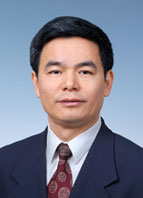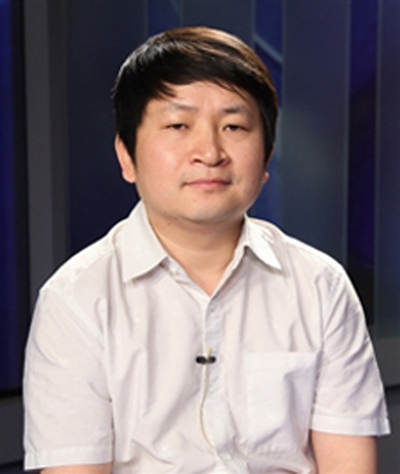Advanced Innovation Center for Future Education of Beijing Normal University
1. Name
Advanced Innovation Center for Future Education of Beijing Normal University
2. The persons in chargeAdvanced Innovation Center for Future Education of Beijing Normal University
Prof. Qi Dong: the President of Beijing Normal University

Prof. Li Chen: the Vice President of Beijing Normal University

Prof. Shengquan Yu: the Executive Director of Advanced Innovation Center for Future Education

3. Research content and significance
lifelong learning and all talent" come true.
4. Problems to be solved
The key issue is to realize the collection of data during learning, the modeling of knowledge and
capability structure, the finding and strengthening of subjects’ advantages and the diagnosis and
improvement of problems during learning for each learner.
To this end, it is necessary to study the academic ability and cognitive model and its visualization
of learners to express individual characteristics and needs; to study the big data based educational
and intelligent technology to build a data analysis model on the basis of subjects in an effort to
achieve adaptive recommendations according to individual needs; to study Mash-up technology of
learning resources and services, in order to achieve a large scale semantic organization of high quality
resources, theme convergence and evolutionary generation, and build an inferable and calculable social
knowledge space so as to realize the combination of online and offline teaching service; and develop the
research mode and methods of integrating intelligent educational service platform into mainstream
education business to explore new forms of education business, governance patterns and application solutions
5. The implementation procedures
To achieve the intelligent education service of "learning assistant" at the first stage: to collect the data of
learning process, visualize the knowledge structure of learners and make intelligent recommendations for
personalized learning, etc.;
To achieve the intelligent education service of "learning partner" at the second stage: to converge thematic
knowledge and achieve semantic structure in the field of basic education so as to answer closed questions
and provide emotional support;
To explore the intelligent education service of "learning supervisor" at the third stage: with an in-depth learning ability, the platform can automatically improve knowledge base to answer open
questions and support the growth of wisdom, and diagnose cognitive problems during the learning
process to provide timely guidance and help.

Prof. Li Chen: the Vice President of Beijing Normal University

Prof. Shengquan Yu: the Executive Director of Advanced Innovation Center for Future Education

3. Research content and significance
lifelong learning and all talent" come true.
4. Problems to be solved
The key issue is to realize the collection of data during learning, the modeling of knowledge and
capability structure, the finding and strengthening of subjects’ advantages and the diagnosis and
improvement of problems during learning for each learner.
To this end, it is necessary to study the academic ability and cognitive model and its visualization
of learners to express individual characteristics and needs; to study the big data based educational
and intelligent technology to build a data analysis model on the basis of subjects in an effort to
achieve adaptive recommendations according to individual needs; to study Mash-up technology of
learning resources and services, in order to achieve a large scale semantic organization of high quality
resources, theme convergence and evolutionary generation, and build an inferable and calculable social
knowledge space so as to realize the combination of online and offline teaching service; and develop the
research mode and methods of integrating intelligent educational service platform into mainstream
education business to explore new forms of education business, governance patterns and application solutions
5. The implementation procedures
To achieve the intelligent education service of "learning assistant" at the first stage: to collect the data of
learning process, visualize the knowledge structure of learners and make intelligent recommendations for
personalized learning, etc.;
To achieve the intelligent education service of "learning partner" at the second stage: to converge thematic
knowledge and achieve semantic structure in the field of basic education so as to answer closed questions
and provide emotional support;
To explore the intelligent education service of "learning supervisor" at the third stage: with an in-depth learning ability, the platform can automatically improve knowledge base to answer open
questions and support the growth of wisdom, and diagnose cognitive problems during the learning
process to provide timely guidance and help.
NEWS
- 2025-02-06AIED 2025 Important Dates Confirmed: The Academic Event in the Field of Artificial Intelligence in Education is about to begin
- 2024-12-19The regional launching meeting of intelligent teaching innovation demonstration and application under the environment of rural network joint research and development program was held in Songtao Miao Autonomous County, Guizhou Province
- 2024-12-17The 2024 Yidan Education Forum was successfully held in Shenzhen
- 2024-12-05Shandong Province digital transformation boost rural education high-quality development seminar and national Key research and development plan project under the environment of the intelligent teaching innovation demonstration application area pilot promotion meeting was held in Zoucheng
- 2024-11-21The demonstration application of intelligent teaching innovation under the environment was established in Xinjiang Normal University
RECRUITMENT
- 2018-09-28Postdoctoral Candidates for 2018 International Exchange Program
- 2016-12-26Researcher/Assistant Researchers in Educational Technologies
- 2016-12-26Researcher/Assistant Researcher in Modern Education Governance
- 2016-03-22Mobile Learning Researcher/ Assistant Researcher
- 2016-03-22Educational and Psychological Measurement Researcher/ Assistant Researcher